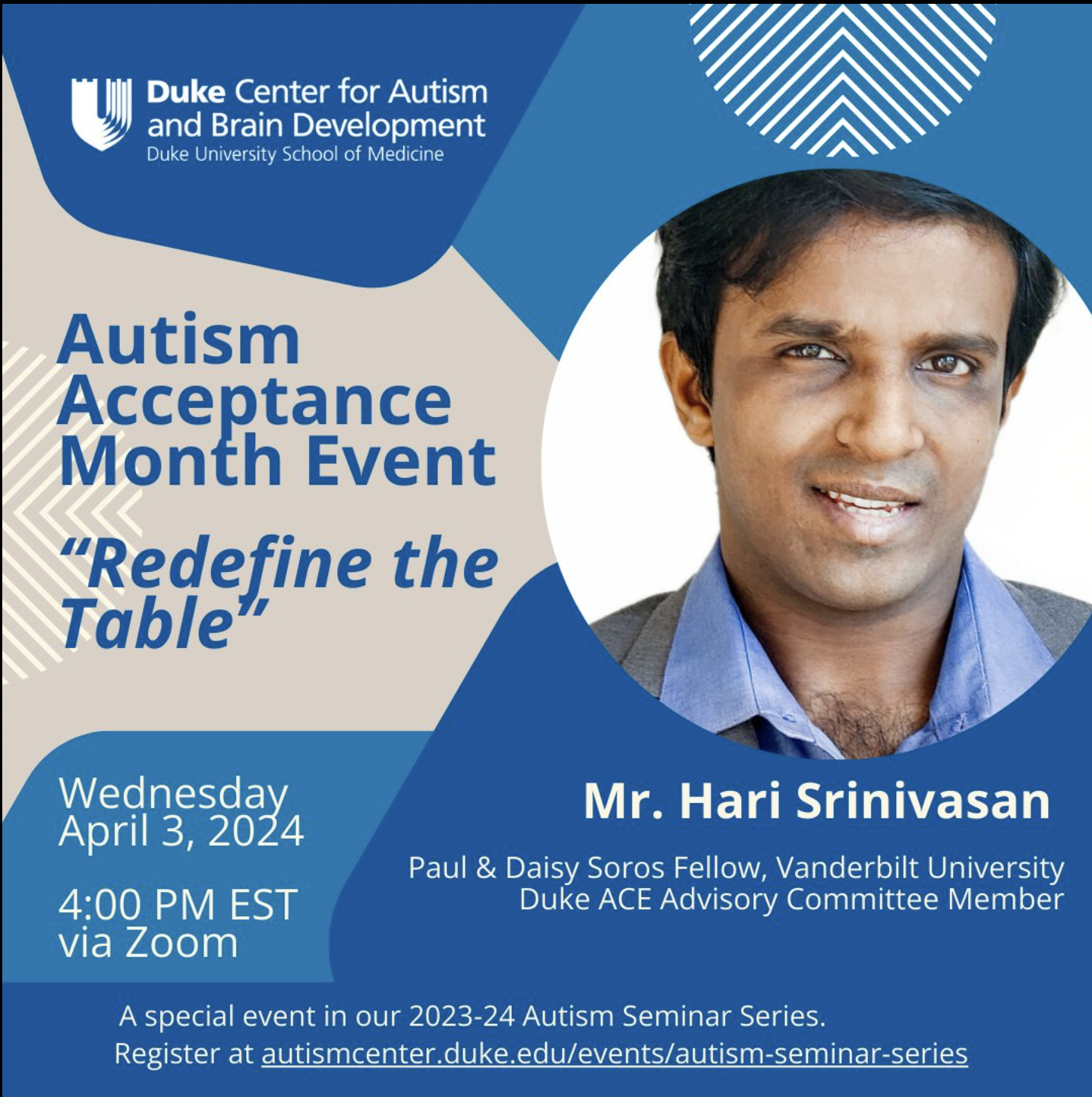My Keynote for Autism Month at Duke.
Registration at.
https://duke.zoom.us/meeting/register/tJcrdeqorDIpHdRE-CRvLPHkzKdL_ta7eYq-#/registration
Autism Acceptance Month Keynote Presentation: "Redefine the Table"
April 3, 2024 | 4:00pm - 5:00pm ET
Zoom WebinarPlease join us for a special event in our 2023-24 Duke Center for Autism Seminar Series! Our Autism Acceptance Month Keynote presenter will be Hari Srinivasan. A self-advocate, Mr. Srinivasan is a PhD student in neuroscience at Vanderbilt University, an alumnus of the University of California, Berkeley, a Paul & Daisy Soros Fellow, a NISE fellow at the Frist Center for Autism & Innovation at Vanderbilt University, and a public member of the Interagency Autism Coordinating Committee. At UC Berkeley, Mr. Srinivasan majored in psychology with a minor in disability studies and graduated as a University Medal Finalist, along with a Departmental Citation Award, Highest Honors, Phi Beta Kappa, and Psi Chi. He was an undergraduate Haas Scholar and carried out a year-long study on awe and empathy in autism. He was also lead student instructor for a weekly class on autism, creating and teaching content that covered a myriad of issues across the lifespan. As a student journalist at The Daily Californian, he wrote over 50 articles on both disability and non-disability topics. As part of his graduate program, he will research the sensorimotor space, specifically peripersonal space (PPS), which has practical implications on multiple fronts for autism. He has autism and ADHD. His autism includes limited speaking ability, sensorimotor issues, health issues, OCD, mood dysregulation and social anxiety. His non-academic affiliations span law and policy to research arenas such as IACC, DREDF, ASAN, ASA, INSAR, Autism Europe and The Brain Foundation. PLEASE REGISTER IN ADVANCE AT THE LINK PROVIDED.
Speaker(s): Hari Srinivasan
Duke Event Series: Duke Center for Autism Seminar Series
Duke Event Co-Sponsor(s): Duke Center for Autism and Brain Development, Department of Psychiatry and Behavioral Sciences, Duke Global Health Institute (DGHI), Duke Institute for Brain Sciences (DIBS)
Duke Event Type(s): Diversity/Inclusion, Lecture/Talk, Webcast
Autism Acceptance Month 2024
Our keynote for Autism Acceptance Month 2024 will be Hari Srinivasan, presenting "Redefine the Table."
Our keynote presenter for Autism Acceptance Month 2024 will be Hari Srinivasan. A self-advocate, Mr. Srinivasan is a PhD student in neuroscience at Vanderbilt University, an alumnus of the University of California, Berkeley, a Paul & Daisy Soros Fellow, a NISE fellow at the Frist Center for Autism & Innovation at Vanderbilt University, and a public member of the Interagency Autism Coordinating Committee.
At UC Berkeley, Mr. Srinivasan majored in psychology with a minor in disability studies and graduated as a University Medal Finalist, along with a Departmental Citation Award, Highest Honors, Phi Beta Kappa, and Psi Chi. He was an undergraduate Haas Scholar and carried out a year-long study on awe and empathy in autism. He was also lead student instructor for a weekly class on autism, creating and teaching content that covered a myriad of issues across the lifespan. As a student journalist at The Daily Californian, he wrote over 50 articles on both disability and non-disability topics.
As part of his graduate program, he will research the sensorimotor space, specifically peripersonal space (PPS), which has practical implications on multiple fronts for autism. He has autism and ADHD. His autism includes limited speaking ability, sensorimotor issues, health issues, OCD, mood dysregulation and social anxiety. His non-academic affiliations span law and policy to research arenas such as IACC, DREDF, ASAN, ASA, INSAR, Autism Europe and The Brain Foundation.













.jpg)








